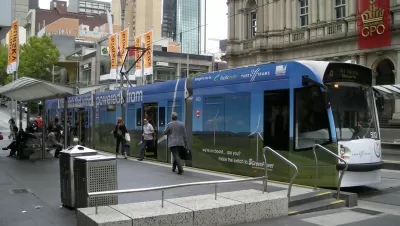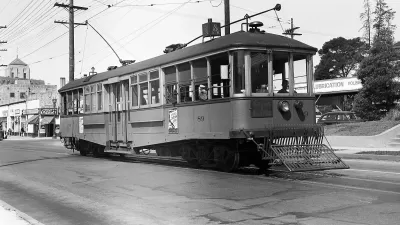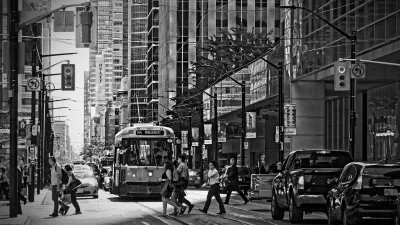A Toronto professor pushes against Christian Wolmar's assertion that the tram's demise can be connected to anti-worker policy. For one thing, trams never went away in some cities.

The history behind the gutting of public transit during the 20th century has been hotly debated. In a recent piece for The Guardian, Christian Wolmar argues that class snobbery contributed to anti-transit policy, with the middling classes preferring the more stately private automobile. Thomas R. Klassen doesn't entirely agree. "[Wolmar] argues that trams were eliminated 'because they catered for the working classes.' But surely that is too simplistic."
Klassen notes that cars quickly became working class transport. "As important in explaining public transit policies is that employment and residence patterns altered dramatically after the second world war. Moreover car ownership – for a while – became the nearly realised dream of many working-class households. In the 1950s and 60s it really did seem that public transportation, with the exceptions of subways and inter-city trains, largely would fade away."
In places like Toronto and Melbourne, trams survived the trend away from transit. "Toronto's trams have survived and prospered for two reasons. The first is that public-transit policymaking in Toronto was, and continues to be, so muddled and slow that politicians never got around to eliminating streetcars." The other, Klassen suggests, is simple good branding.
It's also important to remember that in places with a rising middle class, notably China, people prize both transit and car ownership. Driving has more cachet, but we have yet to see any of North America's historical transit-phobia.
FULL STORY: Thriving tram networks in Toronto and Melbourne

Alabama: Trump Terminates Settlements for Black Communities Harmed By Raw Sewage
Trump deemed the landmark civil rights agreement “illegal DEI and environmental justice policy.”

Study: Maui’s Plan to Convert Vacation Rentals to Long-Term Housing Could Cause Nearly $1 Billion Economic Loss
The plan would reduce visitor accommodation by 25% resulting in 1,900 jobs lost.

Planetizen Federal Action Tracker
A weekly monitor of how Trump’s orders and actions are impacting planners and planning in America.

Wind Energy on the Rise Despite Federal Policy Reversal
The Trump administration is revoking federal support for renewable energy, but demand for new projects continues unabated.

Passengers Flock to Caltrain After Electrification
The new electric trains are running faster and more reliably, leading to strong ridership growth on the Bay Area rail system.

Texas Churches Rally Behind ‘Yes in God’s Back Yard’ Legislation
Religious leaders want the state to reduce zoning regulations to streamline leasing church-owned land to housing developers.
Urban Design for Planners 1: Software Tools
This six-course series explores essential urban design concepts using open source software and equips planners with the tools they need to participate fully in the urban design process.
Planning for Universal Design
Learn the tools for implementing Universal Design in planning regulations.
Caltrans
Smith Gee Studio
Institute for Housing and Urban Development Studies (IHS)
City of Grandview
Harvard GSD Executive Education
Toledo-Lucas County Plan Commissions
Salt Lake City
NYU Wagner Graduate School of Public Service




























